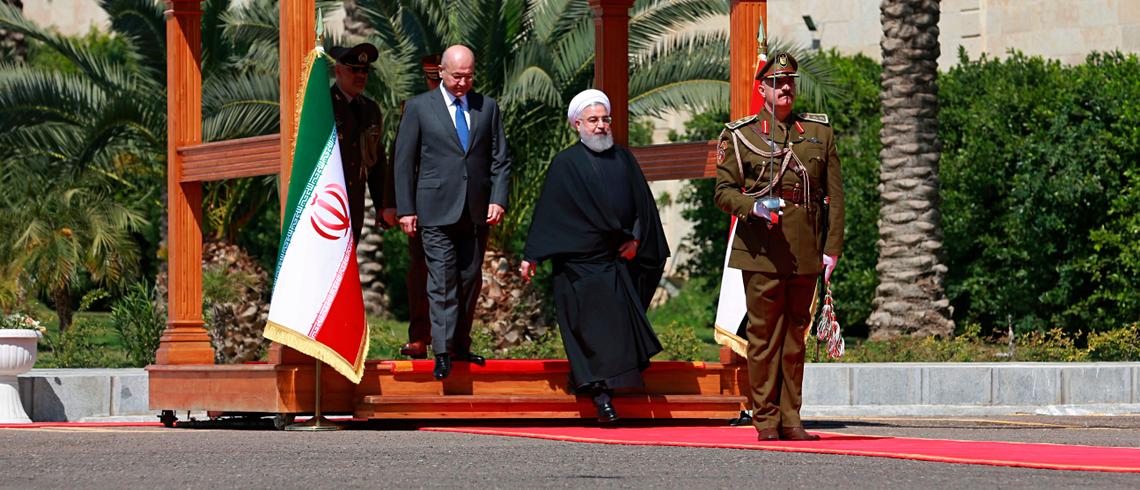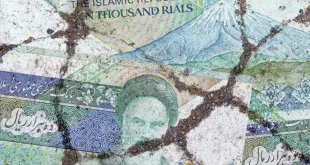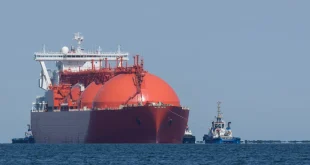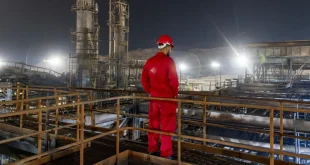The potential for trade and economic growth between Iran and Iraq is enormous but global rivalries are a constant wrench in the relationship.
Rouhani’s official visit to Iraq comes at a time when Iran is experiencing multiple regional and foreign policy challenges partly resulting from the imposition of new sanctions against Iran’s energy industry. According to Iraj Masjedi, the Iranian Ambassador to Baghdad, the purpose of Rouhani’s trip is to strengthen relations between the two countries in political, economic, cultural, and social matters.
With the intention of reducing the effects of the US sanctions against Iran’s energy sector and circumventing sanctions through its neighbours, Iran is interested in boosting its relations with Iraq.
Developing and expanding relations with neighbours is Iran’s first foreign policy priority. Rouhani’s visit to Iraq is his first visit to Iraq as a president. Considering the good relations between Iran and Iraq, this trip could have taken place years ago, but political problems have led to a long-delayed trip.
In his meeting with Iraqi President Barham Salih, Rouhani mentioned the vital role Iraq has in Iran’s regional policy and both countries intentions to boost relations in coming years.
Barham Salih told Iranian journalists that Iraq wants to help the Iranian people reduce the suffering from US sanctions. He said that Iraq and the region would be affected by sanctions, but they are working to minimise the impact – which is quite a strong message to the US government.
Five memorandums of understanding were signed regarding industry, mining, trade, a railroad project, business visas, healthcare cooperation and oil.
Energy exports to Iraq
Iran exports electricity to neighbouring countries, and plans to become a regional electricity hub in the long term. Iran exports between 200 and 250 megawatts of power to Iraq, Afghanistan, and Pakistan. Currently, Iraq is the largest importer of electricity from Iran. The official electricity export agreement between Iran and Iraq was signed in 2005 and has annually renewed. According to the latest deal between the two sides, Iran exports 120 megawatts of electricity annually to Iraq through three transit routes in Basra, Diyaleh, and Amarah.
According to Mohammad Hosseini, the secretary-general of the Iranian-Iraqi joint business room, Iran has $2 billion demand for energy exports to Iraq. Under the contract with Iraq, Iran’s exports of electricity to Iraq are done in dollars, and gas exports to Iraq are done in euros. But after the US invasion, Iraq was not able to pay the price of electricity and gas imported from Iran based on either of these two currencies.
Electricity exports to Iraq have become a thorny issue in bilateral ties. Last summer Iran cut electricity exports to Iraq due to a lack of a domestic network. Some analysts believe that despite the lack of debt payments, Iran intends to continue to export energy to Iraq for political and economic reasons.
Iran’s failure to export power to Iraq has paved the way for Saudi Arabia to invest in the construction of a 3000-megawatt solar power plant in Iraq to increase its presence in the Iraqi energy market with the intention of reducing Iran’s share of the market in the long run and consequently achieve its political goals in Iraq.
Saudi Arabia has offered to sell electricity from the plant for a quarter of Iran’s electricity exports to Iraq. Iranian officials during Rouhani’s visit to Iraq shows their interest to supply Iraqi natural gas and electricity, but there is no significant progress on paying back their debts to Iran.
Iraq’s greater production in shared oil fields
Iran and Iraq share several joint oil and gas fields. The shared fields encompass Azadgan, Azar, NaftShahr, Dehloran, Paydar Gharb, Yaran, Yadavaran, and Arvand.
The Azadegan and Azar oil fields are the most important of the lot. Iraq has been able to extract and produce more oil than Iran and Iraq designed a new oil contract which favoured foreign companies. US sanctions mean Iraq is unable to attract foreign capital and technology to regain its oil and gas production capacity.
Currently, Iraq produces twice as much as Iran from the shared fields.
Iraq, from 2005 to 2017, has been able to increase its oil production from about 1.7 million barrels per day to 4.7 mpbd. In June 2018, Iraq handed over the development of several oilfields near the Iranian border to the UAE’s Alhelal company.
Meanwhile, Iran has also taken steps to increase production in the western part of Karoun, some of which are shared with Iraq. It should be noted that the amount of reserves in the section of Iran, which includes the Azadegan (North and South), and Yaran (north and south) fields, is estimated to be at 64 billion barrels.
The United States has repeatedly called on the Iraqi authorities to reduce energy imports from Iran, but Iraqi officials have declared how hard it’s been to find an alternative.
The two countries potential bilateral cooperation has tremendous commercial potential, but the current complications have prevented Iranian firms from benefiting from the Iraqi market.
Turkish firms have been more successful than their Iranian counterparts in the Iraqi market as the Turkish government supports all the businessmen and the private sector in the Iraqi market. The volume of trade between the two countries is currently at $12 billion, and the two countries are trying to increase the trade volume in the medium term to $20 billion.
Iran intends to use the Iraqi dinar in its exchanges with Iraq instead of the dollar. The possibility of using the Iraqi dinar can have a direct impact on the economic areas in the border regions.
Iran seemingly intends to play a role in rebuilding Iraq, but the presence of Iran at every level is a threat to US interests in the region. Iraqi officials have repeatedly expressed their desire for good relations with their neighbours, primarily for economic growth. The withdrawal of US forces from Iraq has increased Iran’s political influence in Iraq. The active presence of Iran in all political, economic, and military sectors in Iraq can be considered as a trump card against the United States.





